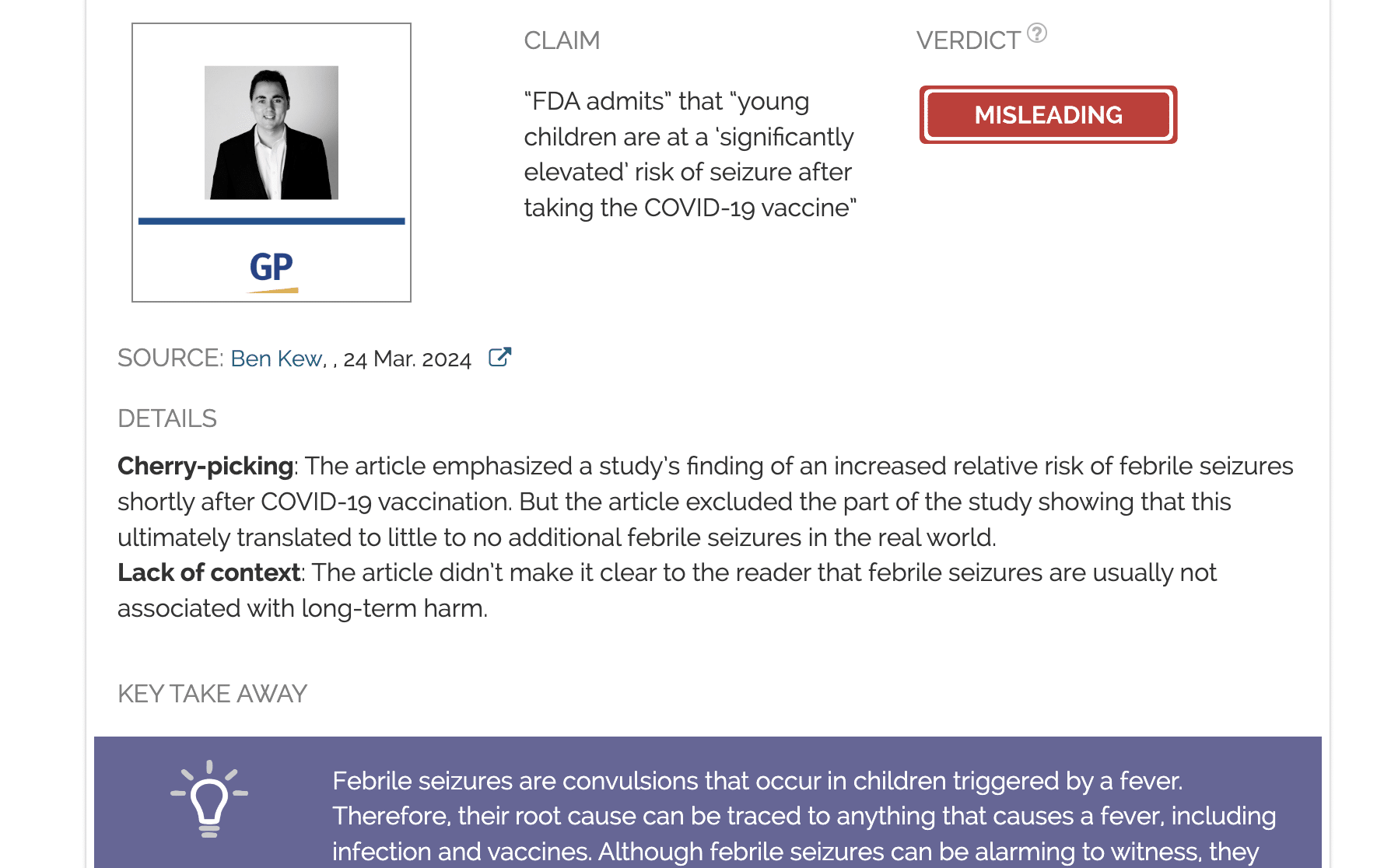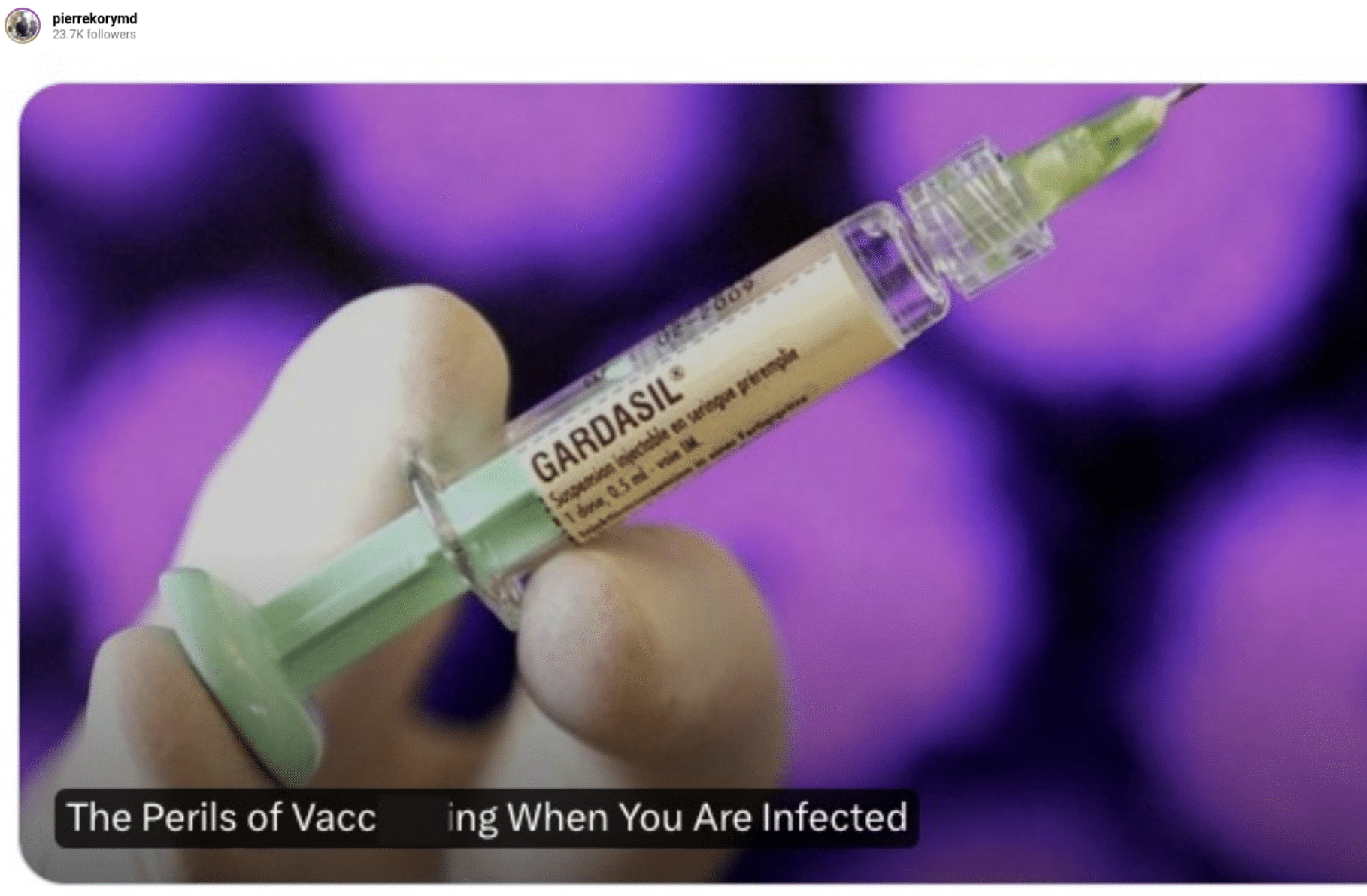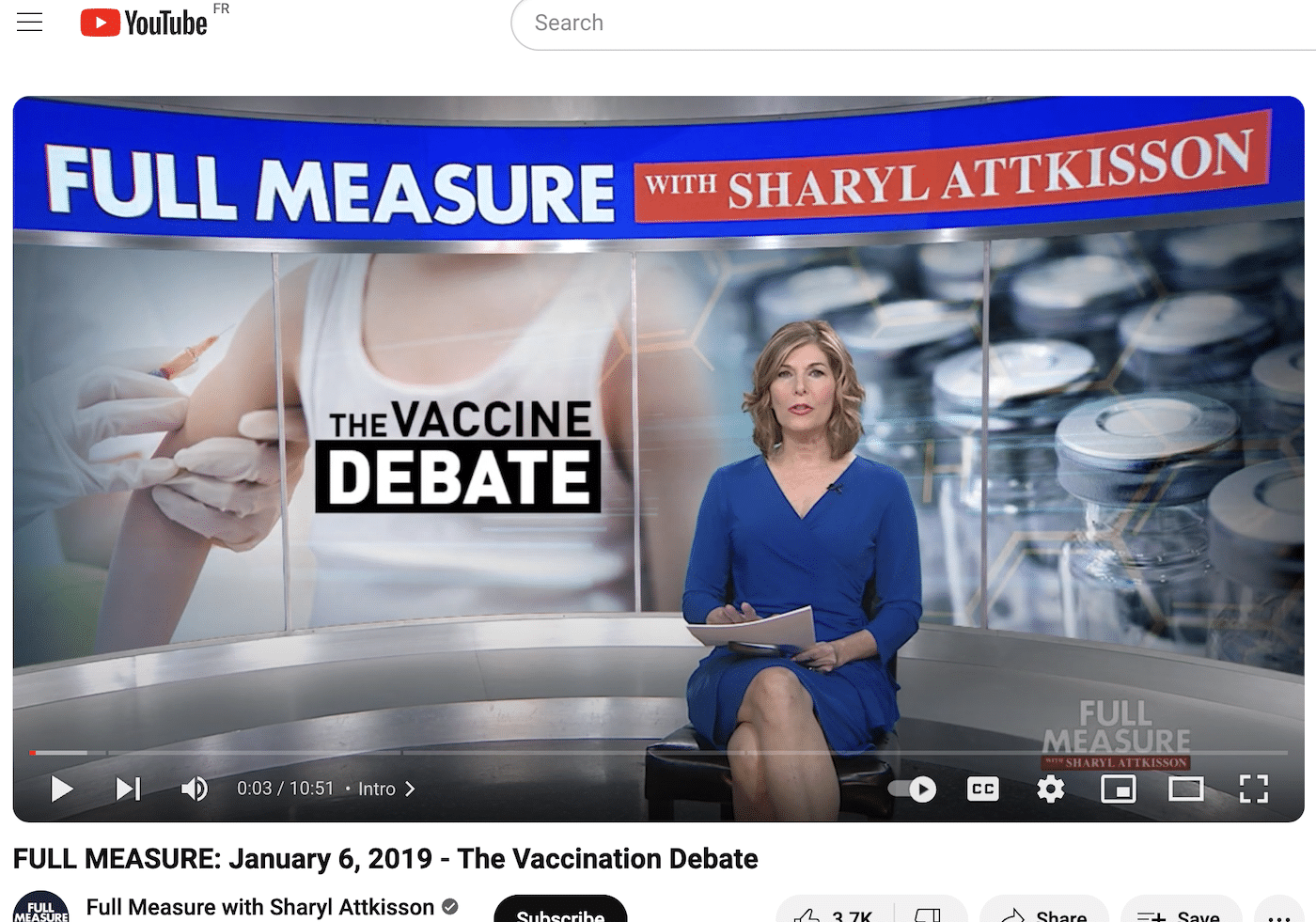- Health
Published studies show no association between COVID-19 vaccines and heart attacks, contrary to British cardiologist’s claim
Key takeaway
Like all medical interventions, COVID-19 vaccines can produce side effects. Most of these side effects are mild and short-lived. More serious risks, such as a rare blood clotting disorder and a type of heart inflammation have also been associated with certain COVID-19 vaccines, but are rare. The risk of heart problems and blood clotting, just to name a few, is greater with COVID-19 than with the vaccines. By reducing the risk of infection and severe disease in people, the vaccines’ benefit outweighs their risk.
Reviewed content
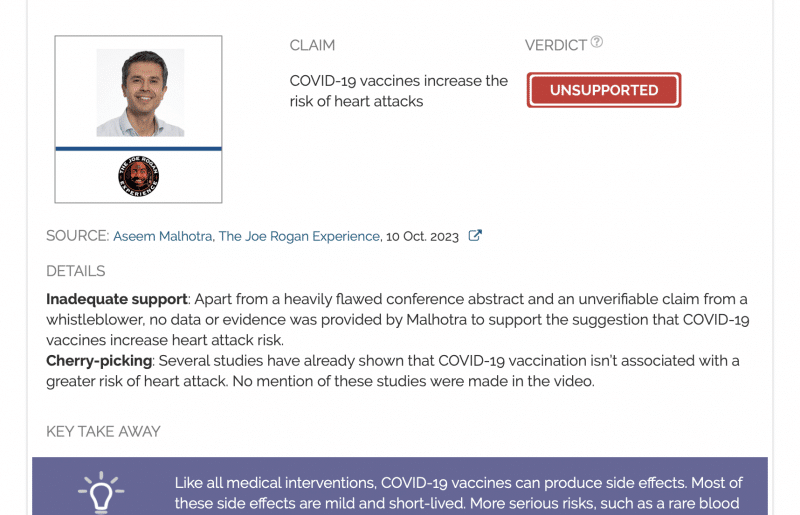
Verdict:
Claim:
COVID-19 vaccines increase the risk of heart attacks
Verdict detail
Inadequate support: Apart from a heavily flawed conference abstract and an unverifiable claim from a whistleblower, no data or evidence was provided by Malhotra to support the suggestion that COVID-19 vaccines increase heart attack risk.
Cherry-picking: Several studies have already shown that COVID-19 vaccination isn’t associated with a greater risk of heart attack. No mention of these studies were made in the video.
Full Claim
“A whistleblower from a prestigious university in the UK” said that vaccinated people had increased inflammation of the arteries of the heart which “increase heart attack risk”
Review
A Facebook reel posted on 10 October 2023 showed British cardiologist Aseem Malhotra on the podcast The Joe Rogan Experience, claiming that “whistleblower from a prestigious university in the UK” told him people who had been vaccinated against COVID-19 had “increased inflammation of the arteries of the heart [that] wasn’t there in the unvaccinated, which again would increase heart attack risk”. He also alleged that the whistleblower had been obliged to keep these findings hidden.
Prior to the pandemic, Malhotra was known for promoting controversial claims about the benefits of the Pioppi diet. He also claimed that statins—drugs used to reduce cholesterol levels—provide no benefit to patients with high cholesterol.
In September 2022, Malhotra published an article in the Journal of Insulin Resistance—a journal of which he is an editor—suggesting that COVID-19 vaccines are more harmful than helpful and that they increase the risk of cardiovascular disease.
Malhotra’s article was panned by other scientists, who pointed out that its argument relied on cherry-picked studies with methodological flaws, anecdotal data and anonymous sources, but excluded data contradicting the article’s argument. Health Feedback wrote about the article in an earlier review.
In January 2023, during an interview with the BBC, Malhotra suggested that excess deaths linked to heart disease were linked to COVID-19 vaccines. This conduct was criticized by experts, and the BBC later aired an interview with physician and scientist Peter Openshaw, who pointed out that the risks of COVID-19 were greater than that posed by the vaccines.
Malhotra’s interview with Rogan took place in April 2023, during which Malhotra proceeded to air the same views as he had done before on COVID-19 vaccines. In the run-up to his whistleblower claim, Malhotra cited a conference abstract by cardiothoracic surgeon Steven Gundry—himself a controversial figure—and news that Scotland had seen a 25% increase in heart attacks in summer 2021.
However, Gundry’s abstract had actually received an Expression of Concern from the journal on 24 November 2021, a few months before Malhotra’s appearance on Rogan’s show.
The notice stated that “there is no data in the abstract regarding myocardial T-cell infiltration, there are no statistical analyses for significance provided, and the author is not clear that only anecdotal data was used”. In other words, no evidence was presented for the claims made in the abstract. The abstract was later corrected, removing its initial claim of “dramatically increase[d] inflammation” and clarifying that no statistical comparisons were performed.
Because the interview doesn’t provide any information about the whistleblower, nor does it provide a publicly available source for the alleged data showing “increased inflammation of the arteries of the heart”, we are unable to verify this claim. We reached out to Malhotra for comment and will update this review with new information if available.
But we can look at whether the broader claim that COVID-19 vaccines raise heart attack risk is supported by evidence so far.
Published studies don’t support this claim. A study performed in Israel and published in the New England Journal of Medicine didn’t find a higher risk of heart attack in vaccinated people relative to unvaccinated people[1].
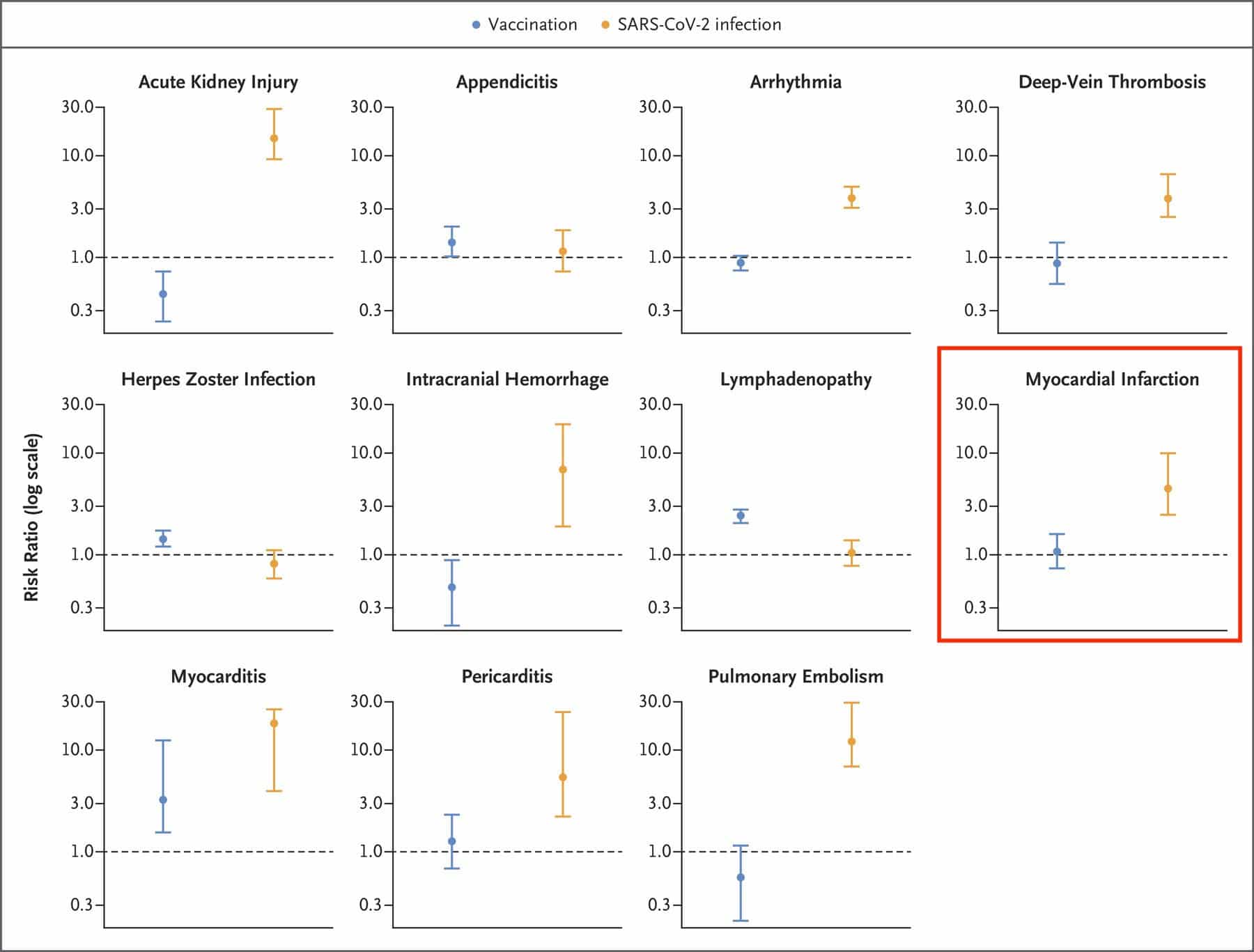
Figure 1. The relative risk of various adverse events after vaccination or SARS-CoV-2 infection. Adapted from the original figure by Barda et al. Note that the effects of vaccination and of SARS-CoV-2 infection were estimated with different cohorts: vaccinated people were compared with unvaccinated people, while those who tested positive for SARS-CoV-2 were compared with uninfected people. Thus, the risks from vaccination and that of infection cannot be directly compared.
Another study performed in the U.S. found no association between COVID-19 mRNA vaccination and heart attack[2].
Studies performed in France also didn’t find a higher risk of heart attack in those above 75 years old[3] and in younger cohorts[4].
A study in Hong Kong didn’t find a greater risk of heart attack in people with heart disease who’d been vaccinated against COVID-19[5].
Moreover, COVID-19 vaccination is associated with a lower risk of developing a heart attack after SARS-CoV-2 infection, as one study in the U.S.[6] and another in South Korea reported[7]. In contrast, getting COVID-19 itself is a risk factor for developing cardiovascular problems, as studies have already reported[1,8].
The American Heart Association states that “People with cardiovascular risk factors, heart disease, and heart attack and stroke survivors should get vaccinated because they are at much greater risk from the virus than they are from the vaccine”.
In brief, numerous published studies haven’t found that COVID-19 vaccines increase the risk of a heart attack and their findings overturn Malhotra’s suggestion that there’s reason to believe otherwise.
READ MORE
British comedian Russell Brand made a similar claim that COVID-19 vaccines caused a rise in heart attacks in young people. Health Feedback debunked the claim here.
REFERENCES
- 1 – Barda et al. (2021) Safety of the BNT162b2 mRNA Covid-19 Vaccine in a Nationwide Setting. New England Journal of Medicine.
- 2 – Klein et al. (2021) Surveillance for Adverse Events After COVID-19 mRNA Vaccination. JAMA Network.
- 3 – Jabagi et al. (2021) Myocardial Infarction, Stroke, and Pulmonary Embolism After BNT162b2 mRNA COVID-19 Vaccine in People Aged 75 Years or Older. JAMA.
- 4 – Botton et al. (2022) Risk for Myocardial Infarction, Stroke, and Pulmonary Embolism Following COVID-19 Vaccines in Adults Younger Than 75 Years in France. Annals of Internal Medicine.
- 5 – Ye et al. (2022) Association between BNT162b2 or CoronaVac COVID-19 vaccines and major adverse cardiovascular events among individuals with cardiovascular disease. Cardiovascular Research.
- 6 – Jiang et al. (2023) Impact of Vaccination on Major Adverse Cardiovascular Events in Patients With COVID-19 Infection. Journal of the American College of Cardiology.
- 7 – Kim et al. (2022) Association Between Vaccination and Acute Myocardial Infarction and Ischemic Stroke After COVID-19 Infection. JAMA.
- 8 – Xie et al. (2022) Long-term cardiovascular outcomes of COVID-19. Nature Medicine.

